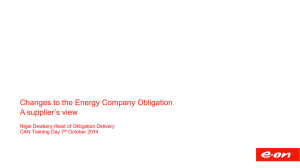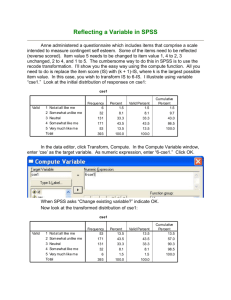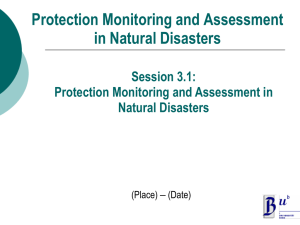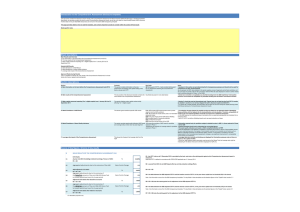presentation slides (pptx: 90.4 KB)
advertisement
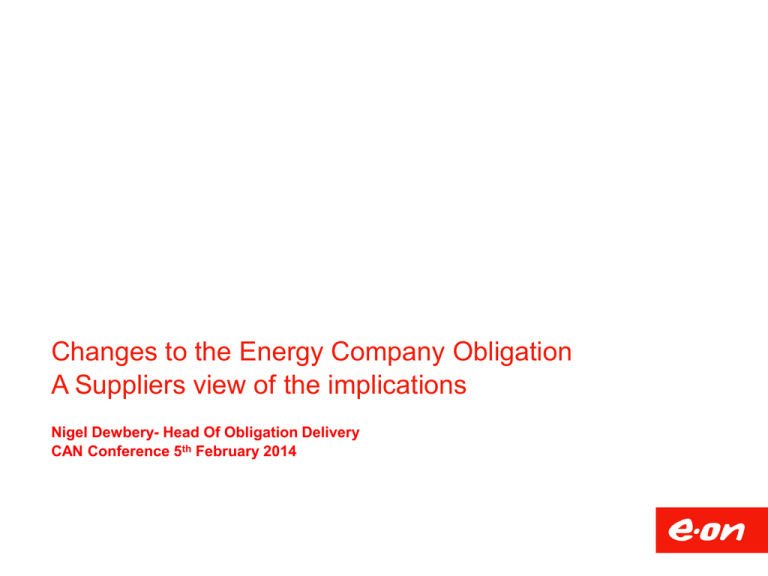
Changes to the Energy Company Obligation A Suppliers view of the implications Nigel Dewbery- Head Of Obligation Delivery CAN Conference 5th February 2014 Contents 1. Why? 2. Timeline 3. Proposed HHCRO changes and impact 4. Proposed CSCO changes and impact 5. Proposed CSCO Rural changes and impact 6. Proposed CERO Changes and impacts 7. Summary 8. Contacts 2 Why? To meet the Governments political need to reduce UK householders energy bills by an average of £50 per household. 3 DECC Timetable Autumn Statement Announcement 2nd December 2013 Public Consultation release Mid Feb 2014 Public Consultation Closes Mid April 2014 Drafting of new SI April-June 2014 New SI before House June/July 2014 Legislation debate and outcome October 2014 BUT some changes will be back dated to 1st April 2014 How do we deliver in April measures that are not actually legal until October? 4 Proposed HHCRO Changes Minimal (or is it)? As its for vulnerable customers 1) 2) 3) 4) No change to scope of HHCRO No change to volume of HHCRO No change to “hard” target at March 2015 Only change, extended at same levels until March 2017 Potential Impact With most Obligated parties progressing well, supply will outstrip demand and with no growth until 2017 this will lead to a reducing rates and unmet supply 5 Proposed CSCO Changes Minimal (or is it)? As its for vulnerable customers 1) 2) 3) 4) No change to volume of CSCO No change to “hard” target at March 2015 Extended at same levels until March 2017 Increase geographical target areas to 25% of lowest deprived areas (and don’t forget 20% can come from the adjacent areas to these) Potential Impact With a 66% increase in the target areas permitted and no growth in current or foreseeable target again Supply is likely to outstrip demand causing reduction in rates and unmet supply 6 Proposed CSCO Rural Changes Minimal (or is it)? As its for vulnerable customers 1) No change to volume of CSCO Rural 2) No change to “hard” target at March 2015 3) Extended at same levels until March 2017 4) New Criteria will include anyone in the lowest 25% LSOAs in rural settlements of under 10,000 population. Potential Impact With an increase in the target areas permitted and no growth in current or foreseeable target again Supply is likely to outstrip demand causing reduction in rates and unmet supply 7 Proposed CERO Changes (1) Previously most expensive and hence broadest changes Many changes all aimed at cost reduction in scope, volume, administration. Key Changes 1) 33% reduction in 2013-2015 volume, with “soft” 2015 target, extended to March 2017 2) New “gateway” measures 3) SWI minima introduced 8 Proposed CERO Changes (2) 33% reduction in 2013-2015 volume, with “soft” 2015 target, extended until March 2017 Clearly a straight forward reduction in volume need Coming half way through, anyone “on target” will be impacted by more that 33% in 2014 Soft 2015 target means no real need to drive to achieve Additional security in longevity Reduction to householders means need to evenly spread balance of 2017 target over whole period. 9 Proposed CERO Changes (3) New “gateway” measures Cavities will no longer be defined as ETT or HTT All cavities, Loft Insulation and District Heating will be stand alone gateway measures and not need SWI or HTTCWI associated Likely to lead to a focus on lower cost cavity measures as way to deliver with little funding availability for higher cost or longer term measures 10 Proposed CERO Changes (4) SWI minima introduced Industry minima delivery proposed of 100,000 households (or carbon equal) between Jan 2013 and Mar 2017. Needed as cost of SWI will be approx 3 to 4 times that of cavity wall However in 2012 the industry installed twice as much as this through CESP. 11 E.on’s approach We have to substantially reduce ECO cost in line with Government requirements however our approach will be 1) To fully complete all obligations and sub obligations on time 2) To deliver at as low a cost as is practical and pass this back to E.on supply customers 3) To renegotiate all existing contracts timeframe, volume and/or measure type to fit into new world 4) To provide as much continuity and security to partners and installers as possible 12 Summary The changes will inevitably have a major impact on the ECO market in that they will 1) Reduce Obligated parties volume targets, less help for everyone inc the vulnerable (cero does deliver vulnerable through social schemes) 2) Remove any option for growth in 2015 and hence benefit for early overdelivery 3) Bring in new gateway measures to CERO 4) Reduce EWI installs across the period 5) Overall provide lower cost delivery of ECO 13 14
